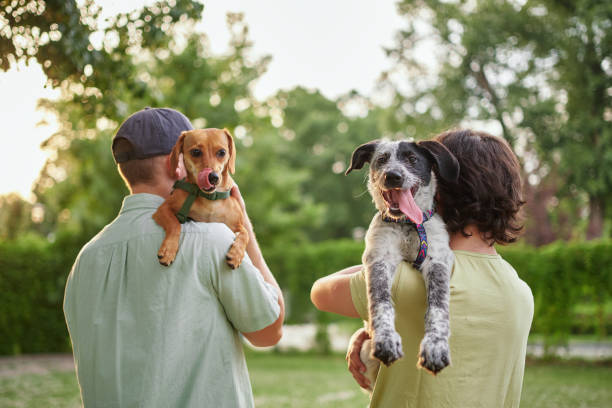
The Health Benefits of Dogs Making Friends
Your dog isn’t meant to go it alone. Like people, dogs thrive on social bonds, and friendships with other dogs offer real physical, mental, and emotional benefits. Whether at daycare, in your yard, or at the dog park, fostering healthy canine friendships can improve your dog’s well-being and strengthen your bond.
At Furry Pet Resorts, we see daily how much happier, calmer, and healthier dogs are when they play well with others. Here’s what research and real-world experience show, and how you can support positive relationships for your dog.
Why Dog Friendships Matter
Dogs are social animals by nature. In the wild, they form packs and rely on relationships. Even domesticated dogs carry that instinct. Research and anecdotal evidence align: dogs with strong social ties are more resilient, more confident, and often more balanced in temperament.
Here’s what dog-dog friendships can deliver:
1. Stress Relief and Emotional Balance
Dogs that play, cuddle, and interact with peers experience less stress and fewer behavior problems. Friendly interaction stimulates positive neurotransmitters (like oxytocin), lowers cortisol levels, and produces what you might call “happy hormones.” Over time, these reduce anxiety, decrease destructive behavior, and improve mood.
2. Mental and Physical Exercise
Chasing, running, wrestling, and social play provide both mental stimulation and physical workout. These are forms of enrichment that engage your dog’s brain and body far more deeply than solo fetch or passive walks. Proper play burns energy, helps maintain a healthy weight, and supports cardiovascular health.
3. Social Skills and Emotional Intelligence
Just like children, dogs learn from interaction. Through play, they learn bite inhibition, body language cues, conflict resolution, and boundaries. Dogs that socialize appropriately tend to be more confident around new dogs, less reactive, and easier to manage in multi-dog settings.
4. Companionship and Reduced Loneliness
When you can’t always be there, your dog’s canine friends can provide companionship. They reduce boredom, mitigate separation-related stress, and keep your pup engaged while you’re away. That sense of connection matters.
5. Enhanced Immune Response (Emerging Evidence)
Though more research is needed, early studies suggest that moderate social exposure may support immune health. Dogs that regularly socialize tend to have fewer stress-related illnesses and lower recurrence of skin or ear infections. Socialized dogs often receive more grooming, attention, and health checks, which in turn helps detect problems early.
Tips to Help Your Dog Build and Maintain Healthy Friendships
Creating a social life for your dog isn’t random playtime; it’s guided interaction. Here’s how you can facilitate friendships that benefit your dog.
Choose the Right Playmates
Not every dog is a compatible match. Match by size, energy level, play style, and temperament. Avoid pairing a timid dog with a super boisterous one. Introduce new friends slowly in neutral territory to prevent territorial behavior.
Supervise Their Interactions
Always monitor first meetings. Watch body posture, tail carriage, play signals, and subtle cues (e.g., head tucks, lip lifts). Step in if the play escalates or gets one-sided. Rotate in short rest periods to prevent overstimulation.
Schedule Regular Play Dates
Consistency is key. Weekly or biweekly playdates build rapport, trust, and positive associations. Rotate between familiar dogs and just one or two new ones so your dog continues learning but feels secure.
Use Structured Social Settings
Dog daycare, supervised dog park sessions, or group classes allow structured socialization with staff oversight. Facilities like Furry Pet Resorts provide safe, guided environments so dogs get social exposure without risk.
Respect Recovery and Alone Time
Just as we need rest after social events, dogs do too. Don’t push them into interaction when they retreat. Offer quiet moments between play sessions. A balanced social life includes downtime.
Signs Your Dog Is Benefiting from Canine Friendship

You’ll know you’re doing it right when you see:
Relaxed body language: loose tail, soft ears, open mouth
Reciprocal play: both dogs initiate and desist play, share turns
Fewer behavioral problems: less chewing, scratching, barking from anxiety
Improved confidence: your dog is calmer in new environments or around strangers
Better physical conditioning: leaner body, healthy coat, steady energy levels
If instead you notice frequent injuries, stress signals (hiding, trembling), or avoidance behavior, it’s time to reassess playmates or supervision.
Addressing Common Barriers
Sometimes, dogs resist socialization. Here’s how you can support even a “less social” dog:
Go slow: Start with parallel walking (dogs side by side with distance) before face-to-face play.
Reward positive behavior: When your dog acknowledges or sniffs another calmly, reward with praise or a treat.
Pair with a calm dog: Choose gentle, balanced dogs for first introductions.
Work with a trainer: Professional guidance helps with dogs that show fear or reactivity around peers.
How Furry Pet Resorts Support Canine Friendships
At Furry Pet Resorts, our mission goes beyond care; we facilitate healthy, meaningful friendships:
We group dogs by temperament, size, and energy so play stays safe and positive.
We supervise every interaction and step in to monitor escalation.
We schedule rest breaks, hydration, and shaded zones to keep social sessions balanced.
We observe changes in behavior or social patterns and alert you if something’s off.
When your dog stays with us, they mingle with familiar pals, maintaining social bonds even while you’re away.
It’s part of how we ensure your pet returns happier, calmer, and healthier.
The Bigger Picture: Why Social Health Matters
Canine friendships don’t just help your dog; they help your whole household:
Better behavior: A happy, social dog is less likely to act out at home.
Reduced vet visits: Fewer stress-related illnesses, injuries from loneliness or boredom.
Stronger bond with you: A fulfilled dog shows more affection and trust.
Peace of mind: When your dog has healthy friendships, they’re more resilient and adaptable.
As pet owners, we often focus on food, training, or medical care. But social health is a pillar just as essential.
Closing Thoughts
Dogs don’t just survive in your life; they shine through relationships with others. When you nurture healthy dog friendships, you’re investing in emotional balance, mental resilience, social growth, and physical well-being for your pet.
At Furry Pet Resorts, every play session, social grouping, and supervision decision is designed to support meaningful, safe connections. If you want a partner in your dog’s social life, we’re here to help because friendships make every tail wag more meaningful.

